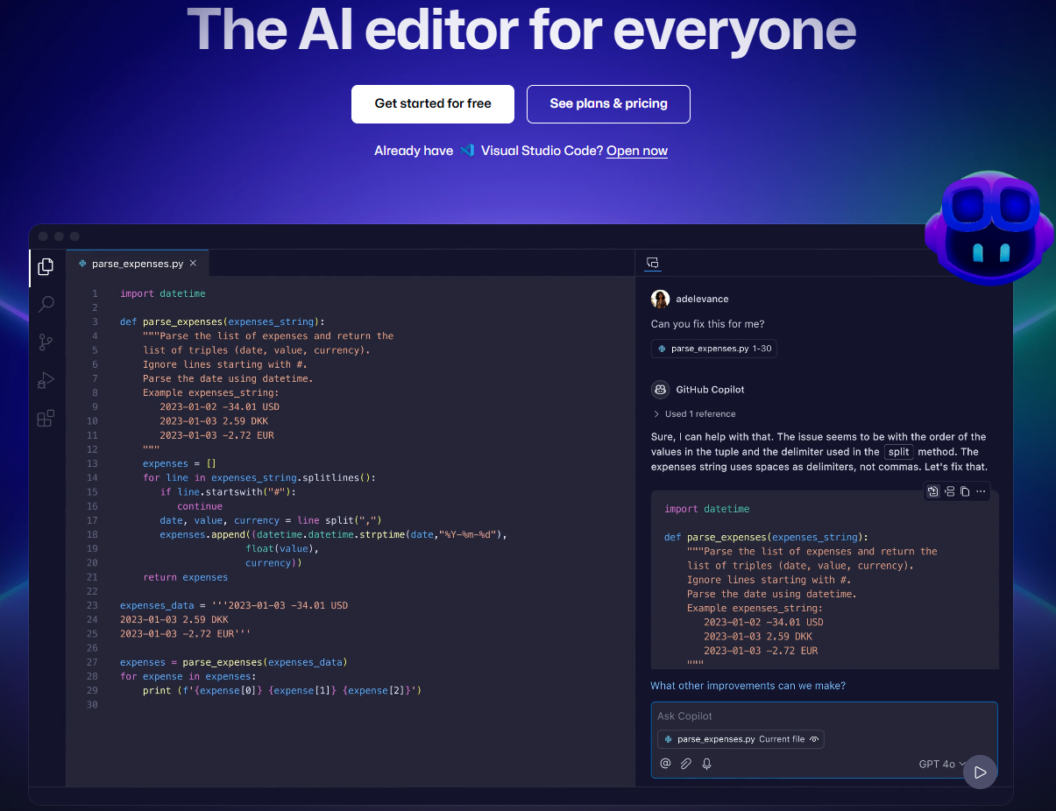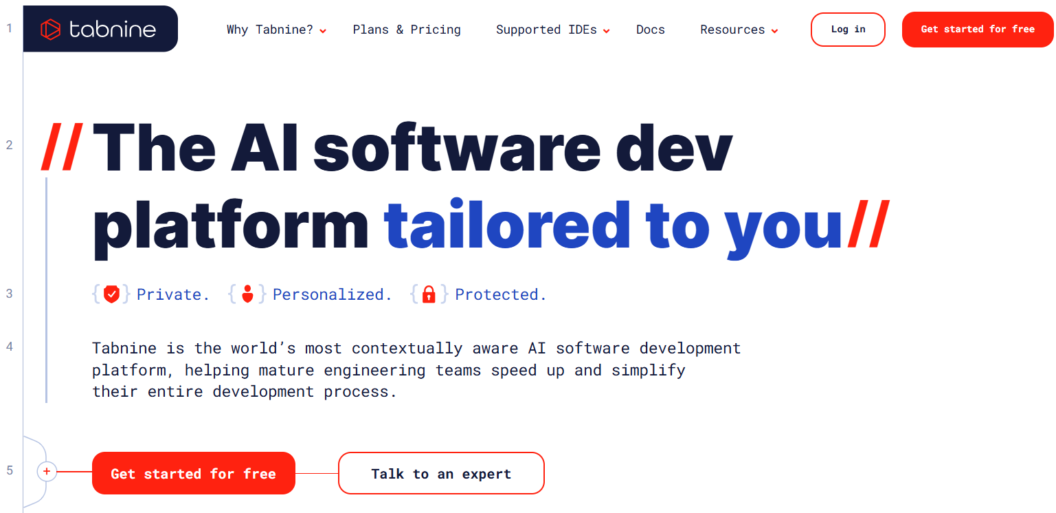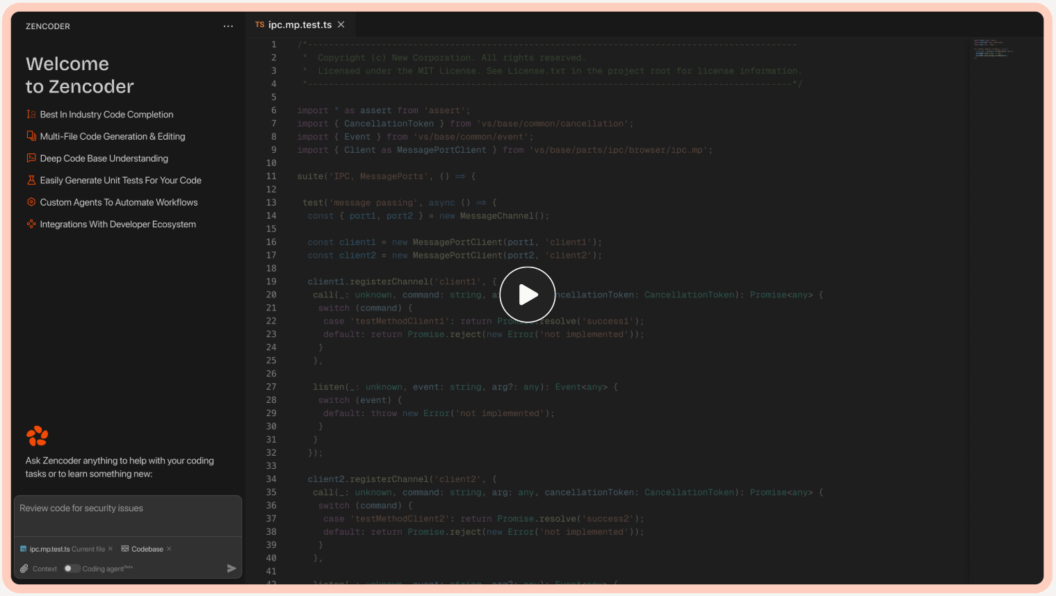AI coding assistants are probably one of the most useful and beloved AI tools of developers, as they help teams save development time, increase productivity and even identify and fix errors and bugs.
In this article, we review the best AI coding assistants for 2025.
Here is what you will learn here:
- What AI coding assistants are.
- Key features to look for when choosing an AI coding assistant.
- A list of the top AI coding assistants for 2025.
Let’s get into it!
What Are AI Coding Assistants?
AI coding assistants leverage LLMs that have been trained on code to help developers in their daily jobs by analyzing and generating code. This means that AI coding assistants can integrate into the developers’ environments — for example, by integrating into popular IDEs like VS CODE — and provide real-time coding suggestions, improve performance, and even automate repetitive tasks.
This helps developers save time, increase their productivity, and even bug hunting.
Over the last months, AI coding assistants have evolved significantly. At the beginning of their history, early iterations were limited to basic autocomplete features, but advancements in natural language processing and machine learning have transformed them into powerful tools capable of understanding context, generating entire functions, explaining complex code, generating tests, and more. So, in 2025, these assistants have become indispensable for engineers, as they bridge the gap between human creativity and machine precision, reshaping how modern software is built.
Key Features to Look for in AI Coding Assistants
If you are searching for an AI coding assistant to streamline your development processes, code generation and suggestions are not the only things you should look for.
In fact, code suggestion is what you basically want from any coding assistant, but you have to look for more than that. So here are the main features to look for:
- Integration with development environments: There is no code development without an IDE. So, as basic as it may seem this is a very important feature. So, verify that the AI coding assistant you are selecting can integrate with your favorite IDE.
- Code generation and autocompletion: At their core, these abilities leverage AI to assist developers by predicting and suggesting code snippets based on the context of what you’re writing. In this context, it is worth noting that the generation and autocompletion can occur in different ways. For example, while basic AI coding assistants provide autocompletion at the end of each code-phrase you are writing, advanced ones provide the so-called “Fill In the Middle” (FIM) — which was first introduced by OpenAI with this paper. This feature enables these assistants to complete code not just at the end of a line, but also within existing code blocks. This is particularly useful in different scenarios, like for refactoring or filling in missing logic in partially written functions, making the assistant more like a collaborative partner rather than a passive ability.
- Debugging and error detection: Debugging, debugging, and again debugging. How many hours do you spend daily finding errors in your code? Well, this is a pain point where AI coding assistants can help you save countless hours of frustration. In particular, they can analyze your code in real time, flagging potential errors, bugs, or inefficiencies as you write. They often provide detailed suggestions for fixes, complete with explanations, which is especially helpful for newer developers or when working with unfamiliar codebases. Also, note that some abilities even go a step further by identifying patterns in your code that could lead to future issues, acting as a safeguard against technical debt.
- Multi-language support: This is another key consideration to make, particularly for teams working across diverse tech stacks or for developers who frequently switch between languages. The best AI coding assistants support a wide range of programming languages, from popular ones like Python, JavaScript, and Java to more niche or domain-specific languages. This flexibility ensures that the ability remains useful regardless of the project or technology being used. Some AI coding assistants, for example, have the ability to support specialized languages like Prolog, Fortran, and Verilog (PaLM 2 is one of these).
The Best AI Coding Assistants for 2025
Now that you’ve learned what an AI coding assistant is and what features to look for, it’s time to take a look at the best ones available today.
GitHub Copilot

GitHub Copilot, powered by OpenAI’s Codex, is probably the most famous AI coding assistant out there. It has been around since 2021, and its popularity has grown exponentially over the years. It integrates deeply with VS CODE and GitHub, offering context-aware code suggestions, autocompletion, and the ability to generate entire functions or boilerplate code based on comments or partially written code.
Best feature
Copilot has the ability to generate entire functions or blocks of code based on natural language comments, making it feel like a true collaborative partner.
Pros
- Provides a free version, with limited access to advanced features.
- Supports several top-shelf LLMs
- It’s excellent at generating boilerplate code and repetitive patterns.
- Supports a wide range of programming languages and frameworks.
Cons
- Suggestions can sometimes be logically incorrect, requiring careful review.
- It can struggle with highly domain-specific or niche programming tasks.
- It relies on cloud-based processing, which may raise privacy concerns for sensitive projects.
Tabnine

Tabnine is an AI coding assistant focused on providing flexible, privacy-conscious code suggestions. It supports a wide range of programming languages and allows developers to train private models on their own codebases, making it highly customizable for specific workflows.
The Enterprise version is a fully private and self-contained environment, allowing you to deploy Tabnine for your business in many ways: as a secure SaaS, on VPC, or on-premises. This is a significant advantage, for example, for teams handling sensitive or proprietary code.
Best feature
The ability to train private models on proprietary codebases, ensuring suggestions are tailored to your specific project while maintaining privacy.
Pros
- Strong multi-language support across a wide range of IDEs.
- Can run locally, ensuring code privacy and security.
- Customizable for enterprise teams with proprietary workflows.
Cons
- Suggestions can feel less contextually aware compared to Copilot.
- It requires setup and training for private models, which can be time-consuming.
- It may lack some of the advanced natural language processing capabilities of competitors.
Zencoder

Zencoder is a newly released AI coding assistant that aims to offer a unique blend of simplicity and power. It integrates seamlessly with VS CODE and provides advanced features like Repo Grokking — which helps the ability better understand your codebase (including the architecture), lowering errors and coding faster — and AI agents — it equips you with agents that seamlessly integrate into your workflow that actively collaborate wit you by providing code repair, developing entire unit tests, and helping you resolve issues on the fly.
Best feature
Repo grokking is surely Zencoder’s best feature, as it provides the ability to read and understand the entire code repository, providing deep contextual understanding before generating code and suggesting improvements. This ensures that every suggestion is relevant, precise, and tailored to your unique context.
Pros
- Through Repo Grokking, Zencoder provides highly relevant and project-specific suggestions.
- Apart from code generation, it also provides unit test creation, code repair, and documentation generation.
- Supports several programming languages and integrates with major IDEs.
Cons
- It’s newer on the market, so its community is under development, while expanding very fast.
- Some advanced features, like agentic pipelines, may not be necessary for smaller projects or simpler workflows.
- While secure, its reliance on cloud-based processing may raise concerns for teams handling highly sensitive data.
DeepCode

DeepCode, now part of Snyk, is an AI-powered tool focused on improving code quality and security. It uses advanced static analysis and machine learning to analyze codebases, identify bugs, vulnerabilities, and inefficiencies, and provide actionable suggestions for improvement. It is particularly strong in detecting subtle security issues that might be missed by traditional abilities, making it a valuable asset for teams prioritizing secure coding practices.
Best feature
Its ability to detect subtle security vulnerabilities and provide detailed explanations, making it a powerful ability for secure coding.
Pros
- Excellent at identifying security issues and bugs.
- Supports multiple programming languages.
- Integrates well with CI/CD pipelines for automated code reviews.
Cons
- Primarily a code analysis ability, lacking real-time autocompletion or code generation.
- May produce false positives, requiring manual verification.
- Limited usefulness for developers focused on rapid prototyping or writing new code.
CodeGPT

CodeGPT is a comprehensive AI-powered development platform designed to transform software engineering workflows. It goes beyond traditional AI coding assistants by offering a suite of specialized AI agents that automate tasks like pull request reviews, code refactoring, and onboarding new developers. With its Agentic AI Platform, CodeGPT provides deep codebase understanding through advanced indexing and graph-based analysis, enabling context-aware suggestions tailored to your specific project.
Best feature
CodeGPT offers the AI agent marketplace: A unique marketplace offering pre-built AI agents specialized in various languages, frameworks, and APIs, allowing teams to customize their workflows and scale productivity effortlessly.
Pros
- You can build and deploy custom agents trained on your codebase and documentation for highly contextual assistance.
- The “Business” tier (pricing not available) offers a self-hosted option to ensure data privacy and compliance.
- It allows you to use DeepSeek: the newly released LLM.
Cons
- The advanced features and customization options may be overwhelming for smaller teams or simpler projects.
- Fully utilizing the platform’s capabilities, such as the Agent Marketplace, may require time and training.
- While secure, cloud-based processing may not suit teams with strict on-premise requirements unless using the self-hosted option.
Conclusions
In this article, you have learned the best AI coding assistants for 2025, what are their best and common features, and their pros and cons.
The future of development empowered by AI coding assistants looks bright, and it seems likely that these tools will continue to evolve and expand their capabilities, becoming increasingly integrated into our everyday work lives.
So, if you haven’t already, start exploring these amazing tools and see how they can enhance your development process!
Also, note that you can run locally LLMs and create your own AI coding assistant. LMstudio is your best chance to do that as it is installable on any OS.
Happy coding!
Want to discuss this article? Join our Discord.
